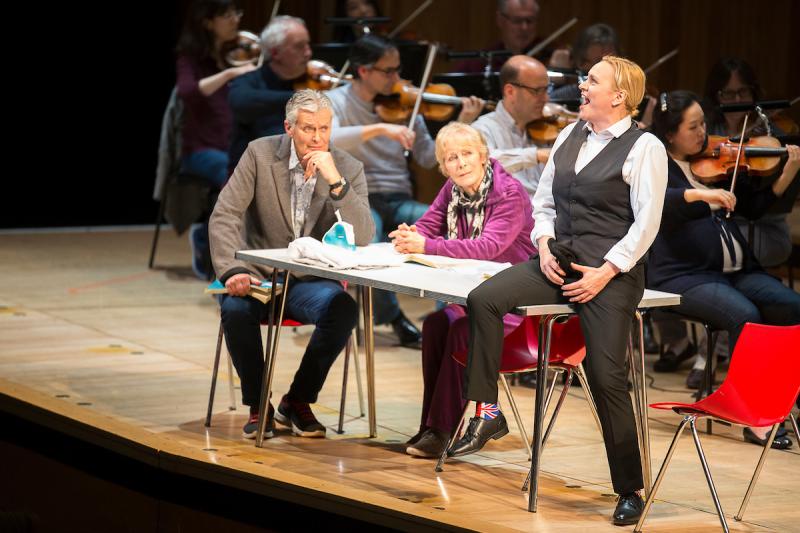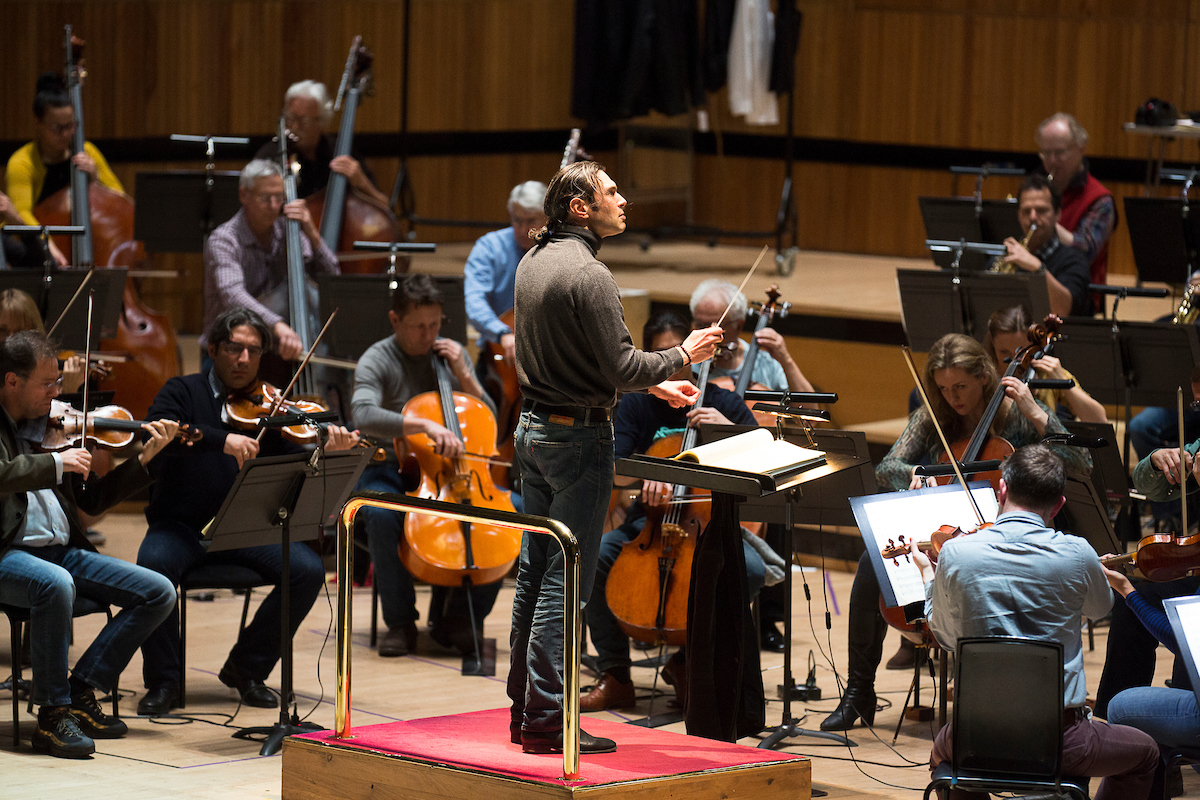Fidelio, LPO, Jurowski, RFH | reviews, news & interviews
Fidelio, LPO, Jurowski, RFH
Fidelio, LPO, Jurowski, RFH
A misguided staging obscured the power of this fine performance

Juxtaposition is a powerful thing.
In a triumph of concept over content, Slater’s semi-staging opened with the orchestra in mufti, tea urns, props tables and costume racks strewn distractingly across the stage. We were witnessing a “rehearsal” of Fidelio, rather than Fidelio itself, complete with two actors (Helen Ryan and Simon Williams) who replaced the opera’s original dialogue with a series of meta-theatrical interventions, wandering through the action and delivering a commentary with aspirations of profundity (“Fear is passive; hope is active”, “Why do good people follow bad orders?”).
 Poorly rehearsed (cues were smudged, microphones problematic, lines forgotten) and poorly conceived (apparently Pizarro – another dictator in the mould of Napoleon, Stalin and Hussein – just wants to be loved after his unhappy childhood, poor lamb), this staging risked undermining everything that Vladimir Jurowski, the LPO and a fine cast were trying so hard to achieve. Thank goodness after the interval we were allowed to graduate to a “real performance”, and with everyone back in concert dress and extraneous clutter cleared away, things began to flow, propelled forwards by a ferociously brilliant, high-wire performance of Leonore No3 from the orchestra.
Poorly rehearsed (cues were smudged, microphones problematic, lines forgotten) and poorly conceived (apparently Pizarro – another dictator in the mould of Napoleon, Stalin and Hussein – just wants to be loved after his unhappy childhood, poor lamb), this staging risked undermining everything that Vladimir Jurowski, the LPO and a fine cast were trying so hard to achieve. Thank goodness after the interval we were allowed to graduate to a “real performance”, and with everyone back in concert dress and extraneous clutter cleared away, things began to flow, propelled forwards by a ferociously brilliant, high-wire performance of Leonore No3 from the orchestra.
Making the theatrical misfire all the more galling was the thrilling quality of much of the music-making. Anja Kampe’s Leonore (pictured above with Robert Dean Smith) pulsed with urgency and fervour, radiant through “O namenlose Freude”, though working audibly hard elsewhere at the top of her range. As Florestan, Robert Dean Smith matched her intensity, balancing raw power with some heart-stopping legato. Sofia Fomina’s Marzelline gilded each ensemble with her bright soprano, sweetly earnest in her dealings with “Fidelio”, and Kristinn Sigmundsson’s generous bass anchored everything as an unusually sympathetic Rocco.
 Though clearly under-rehearsed, the LPO gave a thrilling performance under Jurowski (pictured above), nine times out of 10 turning risk into reward. The woodwind playing in Act II was particularly lovely, the flute’s soft promise of hope singing sweetly out above the orchestral texture, and the collective energy of the Leonore overture made you long for a straight concert performance with nothing to distract from the music’s eloquence. London Voices made a superb chorus, bringing what should have been an unequivocal triumph of an evening to an ecstatic close.
Though clearly under-rehearsed, the LPO gave a thrilling performance under Jurowski (pictured above), nine times out of 10 turning risk into reward. The woodwind playing in Act II was particularly lovely, the flute’s soft promise of hope singing sweetly out above the orchestral texture, and the collective energy of the Leonore overture made you long for a straight concert performance with nothing to distract from the music’s eloquence. London Voices made a superb chorus, bringing what should have been an unequivocal triumph of an evening to an ecstatic close.
Truths are hard to come by these days, and we should nurture those we have. Silence the pseudish chatter of this production and you had Beethoven's powerful statement about hope and humankind. What a shame we could barely hear it over the dramatic din.
- The Southbank Centre's Belief and Beyond Belief festival continues throughout 2017
- Read more opera reviews on theartsdesk
rating
Explore topics
Share this article
The future of Arts Journalism
You can stop theartsdesk.com closing!
We urgently need financing to survive. Our fundraising drive has thus far raised £49,000 but we need to reach £100,000 or we will be forced to close. Please contribute here: https://gofund.me/c3f6033d
And if you can forward this information to anyone who might assist, we’d be grateful.

Subscribe to theartsdesk.com
Thank you for continuing to read our work on theartsdesk.com. For unlimited access to every article in its entirety, including our archive of more than 15,000 pieces, we're asking for £5 per month or £40 per year. We feel it's a very good deal, and hope you do too.
To take a subscription now simply click here.
And if you're looking for that extra gift for a friend or family member, why not treat them to a theartsdesk.com gift subscription?
more Opera
 Carmen, English National Opera review - not quite dangerous
Hopes for Niamh O’Sullivan only partly fulfilled, though much good singing throughout
Carmen, English National Opera review - not quite dangerous
Hopes for Niamh O’Sullivan only partly fulfilled, though much good singing throughout
 Giustino, Linbury Theatre review - a stylish account of a slight opera
Gods, mortals and monsters do battle in Handel's charming drama
Giustino, Linbury Theatre review - a stylish account of a slight opera
Gods, mortals and monsters do battle in Handel's charming drama
 Susanna, Opera North review - hybrid staging of a Handel oratorio
Dance and signing complement outstanding singing in a story of virtue rewarded
Susanna, Opera North review - hybrid staging of a Handel oratorio
Dance and signing complement outstanding singing in a story of virtue rewarded
 Ariodante, Opéra Garnier, Paris review - a blast of Baroque beauty
A near-perfect night at the opera
Ariodante, Opéra Garnier, Paris review - a blast of Baroque beauty
A near-perfect night at the opera
 Cinderella/La Cenerentola, English National Opera review - the truth behind the tinsel
Appealing performances cut through hyperactive stagecraft
Cinderella/La Cenerentola, English National Opera review - the truth behind the tinsel
Appealing performances cut through hyperactive stagecraft
 Tosca, Royal Opera review - Ailyn Pérez steps in as the most vivid of divas
Jakub Hrůša’s multicoloured Puccini last night found a soprano to match
Tosca, Royal Opera review - Ailyn Pérez steps in as the most vivid of divas
Jakub Hrůša’s multicoloured Puccini last night found a soprano to match
 Tosca, Welsh National Opera review - a great company reduced to brilliance
The old warhorse made special by the basics
Tosca, Welsh National Opera review - a great company reduced to brilliance
The old warhorse made special by the basics
 BBC Proms: The Marriage of Figaro, Glyndebourne Festival review - merriment and menace
Strong Proms transfer for a robust and affecting show
BBC Proms: The Marriage of Figaro, Glyndebourne Festival review - merriment and menace
Strong Proms transfer for a robust and affecting show
 BBC Proms: Suor Angelica, LSO, Pappano review - earthly passion, heavenly grief
A Sister to remember blesses Puccini's convent tragedy
BBC Proms: Suor Angelica, LSO, Pappano review - earthly passion, heavenly grief
A Sister to remember blesses Puccini's convent tragedy
 Orpheus and Eurydice, Opera Queensland/SCO, Edinburgh International Festival 2025 review - dazzling, but distracting
Eye-popping acrobatics don’t always assist in Gluck’s quest for operatic truth
Orpheus and Eurydice, Opera Queensland/SCO, Edinburgh International Festival 2025 review - dazzling, but distracting
Eye-popping acrobatics don’t always assist in Gluck’s quest for operatic truth
 MARS, Irish National Opera review - silly space oddity with fun stretches
Cast, orchestra and production give Jennifer Walshe’s bold collage their all
MARS, Irish National Opera review - silly space oddity with fun stretches
Cast, orchestra and production give Jennifer Walshe’s bold collage their all
 Káťa Kabanová, Glyndebourne review - emotional concentration in a salle modulable
Janáček superbly done through or in spite of the symbolism
Káťa Kabanová, Glyndebourne review - emotional concentration in a salle modulable
Janáček superbly done through or in spite of the symbolism

Add comment